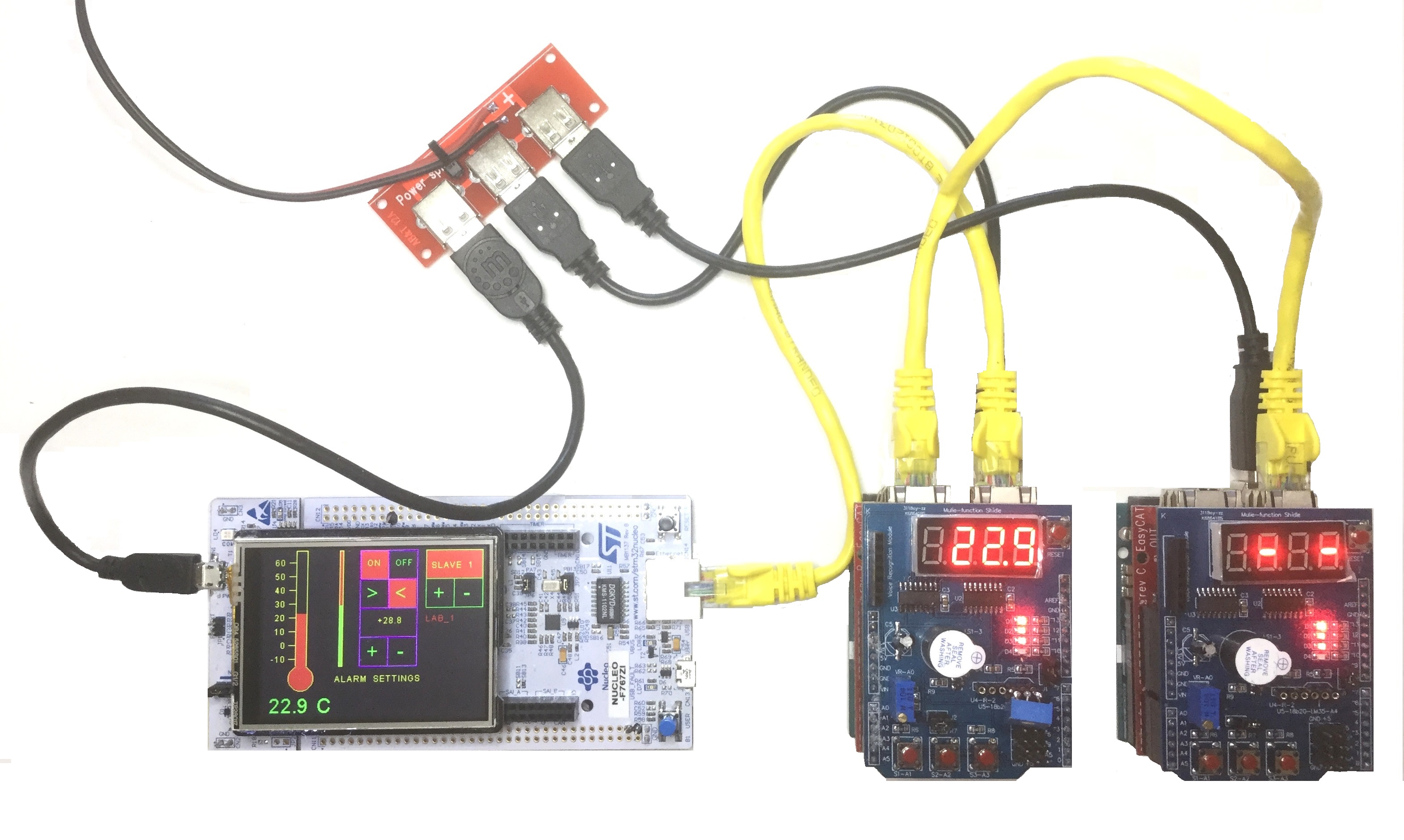SOEM EtherCAT Master library for STM Nucleo F767ZI
Dependents: EasyCAT_LAB_simple EasyCAT_LAB_very_simple EasyCAT_LAB
- This repository contains the SOEM (Simple Open EtherCAT® Master) library by rt-labs, that has been ported in the
 ecosystem by AB&T Tecnologie Informatiche.
ecosystem by AB&T Tecnologie Informatiche.
- It has been developed for the EasyCAT LAB , a complete educational and experimental EtherCAT® system, composed of one master and two slaves .
- The EasyCAT LAB is provided as a kit by AB&T Tecnologie Informatiche, to allow everybody to have an educational EtherCAT® system up and running in a matter of minutes.
Warning
- Currently only the Nucleo STM32F767ZI board is supported.

SOEM/ethercatdc.c
- Committer:
- EasyCAT
- Date:
- 2019-06-11
- Revision:
- 0:543d6784d4cc
File content as of revision 0:543d6784d4cc:
/*
* Licensed under the GNU General Public License version 2 with exceptions. See
* LICENSE file in the project root for full license information
*/
/** \file
* \brief
* Distributed Clock EtherCAT functions.
*
*/
#include "oshw.h"
#include "osal.h"
#include "ethercattype.h"
#include "ethercatbase.h"
#include "ethercatmain.h"
#include "ethercatdc.h"
#define PORTM0 0x01
#define PORTM1 0x02
#define PORTM2 0x04
#define PORTM3 0x08
/** 1st sync pulse delay in ns here 100ms */
#define SyncDelay ((int32)100000000)
/**
* Set DC of slave to fire sync0 at CyclTime interval with CyclShift offset.
*
* @param[in] context = context struct
* @param [in] slave Slave number.
* @param [in] act TRUE = active, FALSE = deactivated
* @param [in] CyclTime Cycltime in ns.
* @param [in] CyclShift CyclShift in ns.
*/
void ecx_dcsync0(ecx_contextt *context, uint16 slave, boolean act, uint32 CyclTime, int32 CyclShift)
{
uint8 h, RA;
uint16 slaveh;
int64 t, t1;
int32 tc;
slaveh = context->slavelist[slave].configadr;
RA = 0;
/* stop cyclic operation, ready for next trigger */
(void)ecx_FPWR(context->port, slaveh, ECT_REG_DCSYNCACT, sizeof(RA), &RA, EC_TIMEOUTRET);
if (act)
{
RA = 1 + 2; /* act cyclic operation and sync0, sync1 deactivated */
}
h = 0;
(void)ecx_FPWR(context->port, slaveh, ECT_REG_DCCUC, sizeof(h), &h, EC_TIMEOUTRET); /* write access to ethercat */
t1 = 0;
(void)ecx_FPRD(context->port, slaveh, ECT_REG_DCSYSTIME, sizeof(t1), &t1, EC_TIMEOUTRET); /* read local time of slave */
t1 = etohll(t1);
/* Calculate first trigger time, always a whole multiple of CyclTime rounded up
plus the shifttime (can be negative)
This insures best synchronization between slaves, slaves with the same CyclTime
will sync at the same moment (you can use CyclShift to shift the sync) */
if (CyclTime > 0)
{
t = ((t1 + SyncDelay) / CyclTime) * CyclTime + CyclTime + CyclShift;
}
else
{
t = t1 + SyncDelay + CyclShift;
/* first trigger at T1 + CyclTime + SyncDelay + CyclShift in ns */
}
t = htoell(t);
(void)ecx_FPWR(context->port, slaveh, ECT_REG_DCSTART0, sizeof(t), &t, EC_TIMEOUTRET); /* SYNC0 start time */
tc = htoel(CyclTime);
(void)ecx_FPWR(context->port, slaveh, ECT_REG_DCCYCLE0, sizeof(tc), &tc, EC_TIMEOUTRET); /* SYNC0 cycle time */
(void)ecx_FPWR(context->port, slaveh, ECT_REG_DCSYNCACT, sizeof(RA), &RA, EC_TIMEOUTRET); /* activate cyclic operation */
// update ec_slave state
context->slavelist[slave].DCactive = (uint8)act;
context->slavelist[slave].DCshift = CyclShift;
context->slavelist[slave].DCcycle = CyclTime;
}
/**
* Set DC of slave to fire sync0 and sync1 at CyclTime interval with CyclShift offset.
*
* @param[in] context = context struct
* @param [in] slave Slave number.
* @param [in] act TRUE = active, FALSE = deactivated
* @param [in] CyclTime0 Cycltime SYNC0 in ns.
* @param [in] CyclTime1 Cycltime SYNC1 in ns. This time is a delta time in relation to
the SYNC0 fire. If CylcTime1 = 0 then SYNC1 fires a the same time
as SYNC0.
* @param [in] CyclShift CyclShift in ns.
*/
void ecx_dcsync01(ecx_contextt *context, uint16 slave, boolean act, uint32 CyclTime0, uint32 CyclTime1, int32 CyclShift)
{
uint8 h, RA;
uint16 slaveh;
int64 t, t1;
int32 tc;
uint32 TrueCyclTime;
/* Sync1 can be used as a multiple of Sync0, use true cycle time */
TrueCyclTime = ((CyclTime1 / CyclTime0) + 1) * CyclTime0;
slaveh = context->slavelist[slave].configadr;
RA = 0;
/* stop cyclic operation, ready for next trigger */
(void)ecx_FPWR(context->port, slaveh, ECT_REG_DCSYNCACT, sizeof(RA), &RA, EC_TIMEOUTRET);
if (act)
{
RA = 1 + 2 + 4; /* act cyclic operation and sync0 + sync1 */
}
h = 0;
(void)ecx_FPWR(context->port, slaveh, ECT_REG_DCCUC, sizeof(h), &h, EC_TIMEOUTRET); /* write access to ethercat */
t1 = 0;
(void)ecx_FPRD(context->port, slaveh, ECT_REG_DCSYSTIME, sizeof(t1), &t1, EC_TIMEOUTRET); /* read local time of slave */
t1 = etohll(t1);
/* Calculate first trigger time, always a whole multiple of TrueCyclTime rounded up
plus the shifttime (can be negative)
This insures best synchronization between slaves, slaves with the same CyclTime
will sync at the same moment (you can use CyclShift to shift the sync) */
if (CyclTime0 > 0)
{
t = ((t1 + SyncDelay) / TrueCyclTime) * TrueCyclTime + TrueCyclTime + CyclShift;
}
else
{
t = t1 + SyncDelay + CyclShift;
/* first trigger at T1 + CyclTime + SyncDelay + CyclShift in ns */
}
t = htoell(t);
(void)ecx_FPWR(context->port, slaveh, ECT_REG_DCSTART0, sizeof(t), &t, EC_TIMEOUTRET); /* SYNC0 start time */
tc = htoel(CyclTime0);
(void)ecx_FPWR(context->port, slaveh, ECT_REG_DCCYCLE0, sizeof(tc), &tc, EC_TIMEOUTRET); /* SYNC0 cycle time */
tc = htoel(CyclTime1);
(void)ecx_FPWR(context->port, slaveh, ECT_REG_DCCYCLE1, sizeof(tc), &tc, EC_TIMEOUTRET); /* SYNC1 cycle time */
(void)ecx_FPWR(context->port, slaveh, ECT_REG_DCSYNCACT, sizeof(RA), &RA, EC_TIMEOUTRET); /* activate cyclic operation */
// update ec_slave state
context->slavelist[slave].DCactive = (uint8)act;
context->slavelist[slave].DCshift = CyclShift;
context->slavelist[slave].DCcycle = CyclTime0;
}
/* latched port time of slave */
static int32 ecx_porttime(ecx_contextt *context, uint16 slave, uint8 port)
{
int32 ts;
switch (port)
{
case 0:
ts = context->slavelist[slave].DCrtA;
break;
case 1:
ts = context->slavelist[slave].DCrtB;
break;
case 2:
ts = context->slavelist[slave].DCrtC;
break;
case 3:
ts = context->slavelist[slave].DCrtD;
break;
default:
ts = 0;
break;
}
return ts;
}
/* calculate previous active port of a slave */
static uint8 ecx_prevport(ecx_contextt *context, uint16 slave, uint8 port)
{
uint8 pport = port;
uint8 aport = context->slavelist[slave].activeports;
switch(port)
{
case 0:
if(aport & PORTM2)
pport = 2;
else if (aport & PORTM1)
pport = 1;
else if (aport & PORTM3)
pport = 3;
break;
case 1:
if(aport & PORTM3)
pport = 3;
else if (aport & PORTM0)
pport = 0;
else if (aport & PORTM2)
pport = 2;
break;
case 2:
if(aport & PORTM1)
pport = 1;
else if (aport & PORTM3)
pport = 3;
else if (aport & PORTM0)
pport = 0;
break;
case 3:
if(aport & PORTM0)
pport = 0;
else if (aport & PORTM2)
pport = 2;
else if (aport & PORTM1)
pport = 1;
break;
}
return pport;
}
/* search unconsumed ports in parent, consume and return first open port */
static uint8 ecx_parentport(ecx_contextt *context, uint16 parent)
{
uint8 parentport = 0;
uint8 b;
/* search order is important, here 3 - 1 - 2 - 0 */
b = context->slavelist[parent].consumedports;
if (b & PORTM3)
{
parentport = 3;
b &= (uint8)~PORTM3;
}
else if (b & PORTM1)
{
parentport = 1;
b &= (uint8)~PORTM1;
}
else if (b & PORTM2)
{
parentport = 2;
b &= (uint8)~PORTM2;
}
else if (b & PORTM0)
{
parentport = 0;
b &= (uint8)~PORTM0;
}
context->slavelist[parent].consumedports = b;
return parentport;
}
/**
* Locate DC slaves, measure propagation delays.
*
* @param[in] context = context struct
* @return boolean if slaves are found with DC
*/
boolean ecx_configdc(ecx_contextt *context)
{
uint16 i, slaveh, parent, child;
uint16 parenthold = 0;
uint16 prevDCslave = 0;
int32 ht, dt1, dt2, dt3;
int64 hrt;
uint8 entryport;
int8 nlist;
int8 plist[4];
int32 tlist[4];
ec_timet mastertime;
uint64 mastertime64;
context->slavelist[0].hasdc = FALSE;
context->grouplist[0].hasdc = FALSE;
ht = 0;
ecx_BWR(context->port, 0, ECT_REG_DCTIME0, sizeof(ht), &ht, EC_TIMEOUTRET); /* latch DCrecvTimeA of all slaves */
mastertime = osal_current_time();
mastertime.sec -= 946684800UL; /* EtherCAT uses 2000-01-01 as epoch start instead of 1970-01-01 */
mastertime64 = (((uint64)mastertime.sec * 1000000) + (uint64)mastertime.usec) * 1000;
for (i = 1; i <= *(context->slavecount); i++)
{
context->slavelist[i].consumedports = context->slavelist[i].activeports;
if (context->slavelist[i].hasdc)
{
if (!context->slavelist[0].hasdc)
{
context->slavelist[0].hasdc = TRUE;
context->slavelist[0].DCnext = i;
context->slavelist[i].DCprevious = 0;
context->grouplist[context->slavelist[i].group].hasdc = TRUE;
context->grouplist[context->slavelist[i].group].DCnext = i;
}
else
{
context->slavelist[prevDCslave].DCnext = i;
context->slavelist[i].DCprevious = prevDCslave;
}
/* this branch has DC slave so remove parenthold */
parenthold = 0;
prevDCslave = i;
slaveh = context->slavelist[i].configadr;
(void)ecx_FPRD(context->port, slaveh, ECT_REG_DCTIME0, sizeof(ht), &ht, EC_TIMEOUTRET);
context->slavelist[i].DCrtA = etohl(ht);
/* 64bit latched DCrecvTimeA of each specific slave */
(void)ecx_FPRD(context->port, slaveh, ECT_REG_DCSOF, sizeof(hrt), &hrt, EC_TIMEOUTRET);
/* use it as offset in order to set local time around 0 + mastertime */
hrt = htoell(-etohll(hrt) + mastertime64);
/* save it in the offset register */
(void)ecx_FPWR(context->port, slaveh, ECT_REG_DCSYSOFFSET, sizeof(hrt), &hrt, EC_TIMEOUTRET);
(void)ecx_FPRD(context->port, slaveh, ECT_REG_DCTIME1, sizeof(ht), &ht, EC_TIMEOUTRET);
context->slavelist[i].DCrtB = etohl(ht);
(void)ecx_FPRD(context->port, slaveh, ECT_REG_DCTIME2, sizeof(ht), &ht, EC_TIMEOUTRET);
context->slavelist[i].DCrtC = etohl(ht);
(void)ecx_FPRD(context->port, slaveh, ECT_REG_DCTIME3, sizeof(ht), &ht, EC_TIMEOUTRET);
context->slavelist[i].DCrtD = etohl(ht);
/* make list of active ports and their time stamps */
nlist = 0;
if (context->slavelist[i].activeports & PORTM0)
{
plist[nlist] = 0;
tlist[nlist] = context->slavelist[i].DCrtA;
nlist++;
}
if (context->slavelist[i].activeports & PORTM3)
{
plist[nlist] = 3;
tlist[nlist] = context->slavelist[i].DCrtD;
nlist++;
}
if (context->slavelist[i].activeports & PORTM1)
{
plist[nlist] = 1;
tlist[nlist] = context->slavelist[i].DCrtB;
nlist++;
}
if (context->slavelist[i].activeports & PORTM2)
{
plist[nlist] = 2;
tlist[nlist] = context->slavelist[i].DCrtC;
nlist++;
}
/* entryport is port with the lowest timestamp */
entryport = 0;
if((nlist > 1) && (tlist[1] < tlist[entryport]))
{
entryport = 1;
}
if((nlist > 2) && (tlist[2] < tlist[entryport]))
{
entryport = 2;
}
if((nlist > 3) && (tlist[3] < tlist[entryport]))
{
entryport = 3;
}
entryport = plist[entryport];
context->slavelist[i].entryport = entryport;
/* consume entryport from activeports */
context->slavelist[i].consumedports &= (uint8)~(1 << entryport);
/* finding DC parent of current */
parent = i;
do
{
child = parent;
parent = context->slavelist[parent].parent;
}
while (!((parent == 0) || (context->slavelist[parent].hasdc)));
/* only calculate propagation delay if slave is not the first */
if (parent > 0)
{
/* find port on parent this slave is connected to */
context->slavelist[i].parentport = ecx_parentport(context, parent);
if (context->slavelist[parent].topology == 1)
{
context->slavelist[i].parentport = context->slavelist[parent].entryport;
}
dt1 = 0;
dt2 = 0;
/* delta time of (parentport - 1) - parentport */
/* note: order of ports is 0 - 3 - 1 -2 */
/* non active ports are skipped */
dt3 = ecx_porttime(context, parent, context->slavelist[i].parentport) -
ecx_porttime(context, parent,
ecx_prevport(context, parent, context->slavelist[i].parentport));
/* current slave has children */
/* those children's delays need to be subtracted */
if (context->slavelist[i].topology > 1)
{
dt1 = ecx_porttime(context, i,
ecx_prevport(context, i, context->slavelist[i].entryport)) -
ecx_porttime(context, i, context->slavelist[i].entryport);
}
/* we are only interested in positive difference */
if (dt1 > dt3) dt1 = -dt1;
/* current slave is not the first child of parent */
/* previous child's delays need to be added */
if ((child - parent) > 1)
{
dt2 = ecx_porttime(context, parent,
ecx_prevport(context, parent, context->slavelist[i].parentport)) -
ecx_porttime(context, parent, context->slavelist[parent].entryport);
}
if (dt2 < 0) dt2 = -dt2;
/* calculate current slave delay from delta times */
/* assumption : forward delay equals return delay */
context->slavelist[i].pdelay = ((dt3 - dt1) / 2) + dt2 +
context->slavelist[parent].pdelay;
ht = htoel(context->slavelist[i].pdelay);
/* write propagation delay*/
(void)ecx_FPWR(context->port, slaveh, ECT_REG_DCSYSDELAY, sizeof(ht), &ht, EC_TIMEOUTRET);
}
}
else
{
context->slavelist[i].DCrtA = 0;
context->slavelist[i].DCrtB = 0;
context->slavelist[i].DCrtC = 0;
context->slavelist[i].DCrtD = 0;
parent = context->slavelist[i].parent;
/* if non DC slave found on first position on branch hold root parent */
if ( (parent > 0) && (context->slavelist[parent].topology > 2))
parenthold = parent;
/* if branch has no DC slaves consume port on root parent */
if ( parenthold && (context->slavelist[i].topology == 1))
{
ecx_parentport(context, parenthold);
parenthold = 0;
}
}
}
return context->slavelist[0].hasdc;
}
#ifdef EC_VER1
void ec_dcsync0(uint16 slave, boolean act, uint32 CyclTime, int32 CyclShift)
{
ecx_dcsync0(&ecx_context, slave, act, CyclTime, CyclShift);
}
void ec_dcsync01(uint16 slave, boolean act, uint32 CyclTime0, uint32 CyclTime1, int32 CyclShift)
{
ecx_dcsync01(&ecx_context, slave, act, CyclTime0, CyclTime1, CyclShift);
}
boolean ec_configdc(void)
{
return ecx_configdc(&ecx_context);
}
#endif

